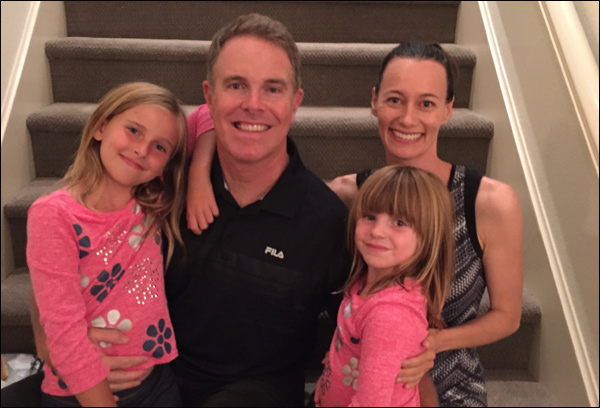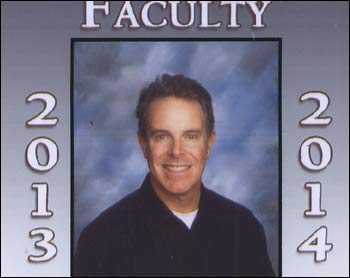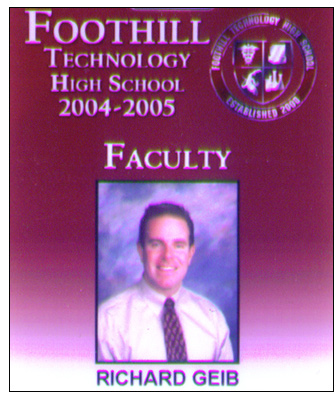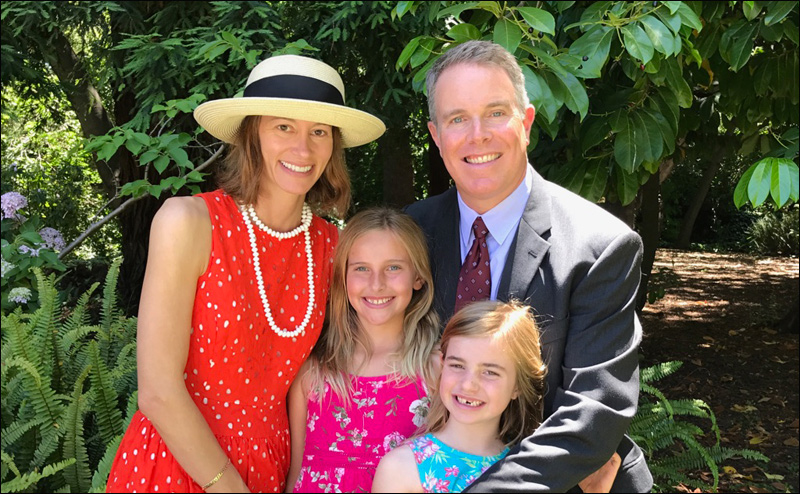FAMILY AND MIDDLE AGE

From the years of approximately 33 to 50.
High school teacher and adjunct college professor; husband and father; tennis player.


Middle Age: A Crossroad
I had previously taught three years near downtown LA, where I learned not much about teaching but did learn enormously about surviving as a teacher and about poverty and how it impacts student performance in the classroom. Next, I taught for three years in precisely the opposite circumstances: an expensive private school in Bel Air. I had taught for six years and was no longer a beginner, but I had not yet truly honed my craft to where I wanted it to be. I knew I was not an expert yet, but I wanted to be.
And I was done living in Los Angeles. I had lived there since my student days at UCLA, but I wanted to work as a public school teacher and raise a family outside of the urban core of LA. So I looked around and discovered a new school in Ventura, California that was not even built yet, focusing on education and technology - my specialty as a teacher. I wrote tw o personal letters and secured a job interview, and then I nailed the interview. So I was one of some dozen teachers chosen to help start Foothill Technology High School in the fall of 2000, and I was only one of two teachers hired from outside the Ventura Unified School District. I moved to Ojai and started my life in a new place. o personal letters and secured a job interview, and then I nailed the interview. So I was one of some dozen teachers chosen to help start Foothill Technology High School in the fall of 2000, and I was only one of two teachers hired from outside the Ventura Unified School District. I moved to Ojai and started my life in a new place.
I was 33 years old, and in helping get Foothill Tech off the ground I had something to prove professionally. There were already two large comprehensive high schools in the district, and Foothill would have to prove itself to be a better choice through its educational offerings if it were to survive. Foothill had to prove itself as a new school, and I spent all my energy and efforts towards doing public education better there than it had been done before in the city of Ventura. In getting in at the ground level I was able to harness my own professional success to that of Foothill Technology High School, and these efforts were eventually more successful that I had ever thought they might be. We put Foothill on the map. It made my career. How? With projects like this one:
Do you see what I mean?
It is exhausting to think about the long and intense hours I worked to help start Foothill Technology High School starting in August of 2000. My fellow teachers and I built an all completely custom curriculum with the new digital tools available at the time, with a focus on project-based curriculum in a smaller-school environment. I would go to work in the morning and put all my energies into a full and intense interacting with my students, and then I would grab something to eat and go home and take a nap as I was exhausted. Then I would wake up refreshed around 4:30 pm and go back to my classroom and work another three or four hours of work on lesson plans and projects and leave in the dark when the janitors closed up around 9:00 p.m. I would return home, eat dinner, go to sleep, and then wake up and do it again. I was then dating Maria, who would eventually go on to become my wife, and she said, “I often saw the back of your head in those days when you work working at the computer.” It was not really the amount of hours I worked; it was the focus and intensity of my efforts towards one goal: the best educational experience for my students. I thought it took two hours of planning and prepping to teach one hour, and I was able to achieve that ratio during those years. I was old enough to know what I was doing as a teacher, and I was young enough to have the energy to do it. I also had the time. I was not married yet. I did not have children.
In 2001, I was able to teach my first Honors class. And in 2002, I piloted “The American Experience” - an interdisciplinary Advanced Placement United States History and Advanced Placement English Language and Composition course for high school juniors. I saw students everyday for 90 minutes, and I was their "humanities" instructor (English and American history) in what was supposed to be college freshman class for advanced high school students. It was an extraordinarily intense learning experience. I developed completely custom curriculum to integrate completely the two classes in a fully digital fashion. I graded essays and read students blogs all weekend and most evenings after work. When the AP exams approached we had mock exams on weekend and history cram sessions at night and at school and in student’s houses. When challenged to achieve academically, my students often surprised themselves and me in their performances; AP classes are what turn on some students to the challenges and rewards of the life of the mind. My years with the American Experience were the crown jewels of my career. I wrote four and five page letters of recommendation afterwards to universities for my AP students, and in 2008 my first student was accepted to Harvard. Most of my AP students went on to the University of California system and enjoyed success there, in part because they had been well prepared in high school. I had enjoyed success, FTHS enjoyed success; our students enjoyed success. We worked ourselves into exhaustion, but oh my did we have fun! high school juniors. I saw students everyday for 90 minutes, and I was their "humanities" instructor (English and American history) in what was supposed to be college freshman class for advanced high school students. It was an extraordinarily intense learning experience. I developed completely custom curriculum to integrate completely the two classes in a fully digital fashion. I graded essays and read students blogs all weekend and most evenings after work. When the AP exams approached we had mock exams on weekend and history cram sessions at night and at school and in student’s houses. When challenged to achieve academically, my students often surprised themselves and me in their performances; AP classes are what turn on some students to the challenges and rewards of the life of the mind. My years with the American Experience were the crown jewels of my career. I wrote four and five page letters of recommendation afterwards to universities for my AP students, and in 2008 my first student was accepted to Harvard. Most of my AP students went on to the University of California system and enjoyed success there, in part because they had been well prepared in high school. I had enjoyed success, FTHS enjoyed success; our students enjoyed success. We worked ourselves into exhaustion, but oh my did we have fun!
I was completely absorbed by teaching. Or to be more exact, I was consumed by learning for myself, and then translating that learning to others by "backwards planning" lesson plans that would finally lead up to some grand culminating project -- all brought to life by cutting edge multimedia technology, and leveraging the ability to communicate online and build artifacts that would enable and showcase student learning. I would introduce a topic and set the stage, and then students would take my introductory information and then take it to the higher levels by themselves (Hegel's thesis, antithesis, and then synthesis). During these years I would sometimes build projects (usually online "webquests") that I knew I would never have the time to teach to students. I would build this curricula on weekends out of the sheer intellectual enjoyment of building such curricula.
Around this time (2006) I came to start working as an Adjunct Professor in Azusa Pacific University teaching in their Advanced Studies in the graduate School of Education. In short, I taught student teachers (“baby teachers,” I called them) in evening classes how to use digital tools and to craft lesson plans and student project that would allow students to fully gain access to curricula. I talked about school, the purposed of school, the power of multimedia and how to allow students to create meaning from sharing their learning through technology. I was a part-time professor teaching graduate school who was really a high school teacher - APU brought me in as an expert practitioner who could serve as a professor that could help novice teachers move into the classroom and survive and be successful. I gave instruction and encouragement in about equal parts to my graduate students, and I always reminded them that they would never have to be first year teachers ever again after that first rough year of teaching was over. The APU EdTech Dept. at that time under Dr. Joanne Gilbreath was a hotbed of teacher creativity and sharing: we professors would share approaches to learning, have lively debates about the politics of American public education, argue charter vs. traditional public schools and the pros and cons of teacher unions, etc. (These debates among engaged educators would usually revolve around the following question: “Does public education have to be as bad as it usually seems to be?”) I read books in my free time about public education and stayed abreast of all the heated conversations. I would hear two different arguments on a controversy in American education, and I would have three opinions. I made up my own curricula, revised curricula with others, and graded graduate student curricula. I went to teacher conferences, and sometimes gave presentations at them. I won awards. I was a committed educator up to my eyeballs in edu-world, both in high school and in college.
It was a long way from Berendo Middle School. Even in my darkest days of teaching in the inner city, I knew there was better out there for me. I went out and got it. I earned it. But it cost me nothing less than blood, sweat, and tears. Anything difficult but worth doing in life costs you a part of your soul, in my opinion.
FAMILY MAN
But then Maria and I became pregnant in 2006 and started our family nine months later (evidence). Much changed. It was not so much that I changed, but my circumstances had changed. Or maybe the circumstances of having babies of my own did, in fact, change me? At any rate, I was a new father, and so in many ways I was a different man than before. Look at some of my writings from this time:
- On Becoming a Father (September 2006)
- On the Middle Name of My Firstborn Daughter: In Honor of Jeremy Glick (October 12, 2006 )
- Work and Home: the Balance (December 28, 2006)
- Heart Scare (January 22, 2007)
- A Prayer for My Daughter (April 6, 2007)
- "Read to Your Child" (June 2007)
- Family Bliss (July 25, 2007)
- "Don't Worry - She Won't Remember This --" (July 8, 2008)
- A Stereotype Come to Life: The Worried Father (January 5, 2008)
- Spring: Coming Up For Air (March 12, 2008)
- Family Bliss: A Morning to Remember Forever: One morning the dynamic is captured in words.
- On My Beloved Daughter, Crying in Her Crib (July 12, 2008)
- First Letter to My Second Child (June 27, 2009)
- Second Letter to Elizabeth Anne (September 7, 2009)
- Third Letter to My Daughter (October 12, 2009)
- Welcome, Baby! (February 19, 2010)
- Second Birthday Letter to EA May 17, 2012
- “Dear ‘Mother-to-Be,'” Letter to a New Mother (May 24, 2012)
- “Happy Fifth Birthday, Daughter Julia!” (May 21, 2012)
- Dear Elizabeth Anne At Four Years of Age (August 25, 2014)
A few seconds ago I claimed that doing anything hard costs you a part of your soul -- a goodly portion of your life’s energy. Working as an educator clearly did that for me. But so did parenting and family life, as the many above parenting essays show. (What was I doing so much in those numerous essays? Like in so much in my webpage, I was seeking to make sense of what was happening to me through the written word; I was processing the becoming a father.)
So my wife, Maria, and I married in 2006, and now we had our daughters Julia in 2007 and Elizabeth in 2010, and therefore I had serious claims on my attention that I had not in earlier days. I began to feel overwhelmed in a way I had not before, as if there were too many obligations pulling me in too many directions. This was an intense time: I had two small children at home, taught intense and demanding Advanced Placement United States History classes, and had a second job teaching graduate school at night.
That second job at Azusa Pacific University, in particular, helping to train future teachers, threatened to be the straw that broke the camel’s back. I would teach from 8:00 a.m. until 3:30 p.m. during the day, and then I would go teach a college class from 4:45 pm until 9:30 at night – that next day workday I would feel the fatigue and stress in the muscles of my back. Sometimes my back would even “give out” and I would walk around like a hunchback and sleep painfully for a week or so; my back giving out in such moments was entirely related to overwork. I was on the edge with this second job, and I still had the first full-time job (and wife and young children).
It was a stressful but important time in my life. The second job in the evenings made the ridiculously expensive child care bills manageable, in addition to the usual mortgage, car payments, auto/home insurance, food, etc. I was juggling many balls at the same time, but of all the responsibilities I had my family and daughters were the most important. Even busy (overwhelmed?) as I was, I would put family first. Hence my wife and I had babies who over several years became toddlers and then turned into little girls, and they were my first priority. (Between my wife and daughters there was a lot of estrogen in my house.)
I came to see it as a zero-sum game: the more time I spent on school and with my students, the less time I had for my own children and family. There was only so much time in the day, and I had only so much energy; I came to see that I could not be all things to all people. I would have to choose. And when push came to shove, I would choose my own children over my students. I wanted to do well at work and I wanted to do well at home, but there was only so much time and energy – and to excel at one came at the expense of the other. I wanted to serve my students well, and I think I did; but I would not work past a certain point. Before I was a father, I had almost unlimited time to excel at work. Now, as a father, I didn’t.
I remember seeing teachers who would brag to me how they could not spend time with their own children on weekends because they were busy grading papers. I promised myself that would not be me; I would have a precious few years with my young children, and I would take full advantage of them.
You see what I mean? I asked myself if/when I turned 70, would I wish I had spent more time at work, or more time with my family? Especially when my children were young? I have often thought how the Catholic Church had a point when it used unmarried labor which could commit totally to work without the distractions of family.
Most adults struggle to balance work and family responsibilities in America, and clearly I was no exception. But when push came to shove, I chose family over work. “One’s work life goes through stages,” I told myself, “and a career is not a sprint but a marathon.” Maybe when my children were older and needed me less, I would again make teaching my first priority. I could again be the teacher I was in 2007. I put a solid day's work in with my students and did a solid job. But not an outstanding job. (I knew the difference between the two.) Teaching held nowhere near the control over my imagination that it did. My intellectual energies began to flow elsewhere.
Thus becoming a father meant a severe diminution in my professional ambition. Time previously spent thinking about teaching, planning my teaching, and actually teaching came to be gradually replaced by time thinking about parenting and actually parenting. But you can read my way too long work autobiography written over many years --
-- and you will notice, gentle reader, as you get towards the end that I had out of love with teaching. Or at least I had come almost full circle in my teaching career.
I still generally enjoyed my students, and when I looked them in the face I wanted to know I'd done a good job by them -- to use their time, not waste it, in class. But I had fallen out of love with the American educational system. I expected little from it. I knew in my bones it would pretty much be what it was yesterday and today, with little hope for tomorrow. It was what it was. I could not change that. My mental energies moved elsewhere. I would see major articles in national publications on issues in the schools or the debates about the educational system in America and I would skip them. "I know this sad story about the schools in my bones," I would think. "Boring... What else is there in the news?"
So I think it appropriate that I would no longer use my professional life as the defining central experience of autobiography section of my personal webpage. Work was work. What else?
TENNIS PLAYER
Well, I came back to a love of sweat and play I so enjoyed and indulged when I was a child. After a break of some thirty five years, I came back to the sport of tennis. I wanted to play a game with a ball, just like when I was seven.
In late 2011 it was almost this simple: I realized that for several years I had done nothing but teach classes, grade papers, change diapers, and catch sleep whenever I could. I had lost myself a bit in being so preoccupied by work and family responsibilities. Did I have any hobbies? Individual pursuits? Anything that was my own and nobody else's? Not really. So I joined the Pierpont Racquet Club and started playing tennis again. I had played much as a child, but I hadn't really played any tennis since I was fourteen years old back in 1980. Thirty one years later I was plenty rusty in my tennis strokes, and I had completely forgotten how to hit a two-handed backhand. But I jumped back into tennis, promptly got a bad case of tennis elbow, jumped into the pool and swam until it healed, and then was back out on the court again. Exercise, exercise, exercise! I loved playing a game with a ball like I was a little boy again, and competition got the testosterone flowing. I could go play a hard match of tennis, and afterwards when I returned home I was a better husband to my wife, father to my children, and teacher to my students. It was my break, my relief, my fun during the week.
Also, as I argued to Maria in spending the money to join a private tennis club, it was not only me but our whole family that would join and benefit. Our family would be active and laugh and sweat under the sun at the PRC on a routine basis. I wanted my kids to grow up on Ventura tennis courts, as I had grown up on the Newport Beach Tennis Club courts. I wanted them to learn to swim at the Pierpont pool. (They did.) The PRC cost a good chunk of change every month, but I told Maria that if we did not use it at least three times a week we would cancel our membership. But we were there more than three times a week; one of our family, at least, was there almost everyday. Since it cost more money that the average health club, it was much less crowded. The club had parties, BBQs, and a restaurant. A part of me concluded that after so many years of working I deserved to spend some money, belong to a private club, and have a more enjoyable experience than I had had at those huge, crowded, but less expensive clubs like the YMCA or LA Fitness. At the Pierpont Racquet Club, I did not encounter preening 20 years old males flexing in front of the mirror and looking at their muscles during workouts. The locker room did not smell like foot. The place did not smell like sweat. The PRC staff knew our names and would hand us a towel and greet us with a smile at the door. I made the club my second home. My tennis teammates - and good friends - were all there. I won the the annual club tennis tournament at various levels. I grew to become a solid 4.5 player and played regularly in USTA leagues. A demanding two sets of tennis followed by a beer was about as good as my life got.
Maybe this was my "mid-life crisis." As I approached fifty years of age I realized that I had to exercise vigorously to earn my appetite during dinner and get a good night's sleep. At a younger age exercise might be less important, and even optional. But as I aged I came to see exercise as mandatory and more a matter of bodily maintenance than of "looking good." In short, I would not feel comfortable in my skin if I did not get a solid sweat on almost a daily basis. (Or maybe I did feel this way when I was younger, but I was just too busy building a career and family to notice?) Of course, running at full speed on a concrete tennis court at this age meant I almost always was on the verge of getting injured. I tore my rotator cuff in November of 2014 and had to have surgery on it. But I got way more from tennis than it took from me, overall. And my kids were on the court or in the pool with me much of the time. We would not be sitting around the house overlong; we would go outside and be active; we would make of our bodies our friends. This is the vision I had for our family life: the California sun and California health.
I even got my friend and fellow educator Chris Prewitt to join the Pierpont. He did so when he got promoted to an administrative position and received a raise, and Chris too felt that finally he could afford and enjoy belonging to a private tennis club. We became doubles partners and played an epic tournament match which I remember still. Then, senselessly, he was run over by an "impaired" driver while training for a marathon, in what is still one of the biggest shocks of my life. Years later I still don't quite know what to make of his sudden death. Confusion? Grief? Dislocation? Incredulity? All of these things.
I had the front page newspaper article of his death (titled, "LOCAL EDUCATOR KILLED") on the passenger seat of my car for weeks after Chris was killed, and I would look over at it periodically in disbelief while driving. One saw tragic headlines like this all the time, but now the article in question was about one of my best friends. It was like a nightmare. It still seems strange to me somehow that it happened. And utterly senseless. Driving home the night after Chris died and trying to decide how to break the bad news to my daughters was still one of the harder parenting moments I have ever had, and I came to this conclusion: just say it straight up and present the unadorned truth, which is what I did. My younger daughter Elizabeth was three years old at the time, but she understood well enough the gist of what had happened: for months afterward she would cry hysterically if Maria or I were out of sight, thinking we had died suddenly like Chris.
But life continues on, and now it is years since Chris died. The past recedes, but one does not forget. One comes to sense that there is less of life in front than behind.
I sometimes waxed nostalgic for the California past of my childhood, and grew suspicious and unhappy with the country I lived in now --
-- and so I began to despair, and to grow a bit old. Or maybe "middle aged" is the right term?
I had less and less interest in what new trends younger persons in their 20s and 30s were engaged in, and I had less and less curiosity about foreign countries and cultures and "wars and rumors of wars." My father, during the election of 2012, heatedly tried to get me to see the grave peril to the country which was Barack Obama, candidate for the presidency. I listened to him patiently, and then pointed towards a guy struggling to load groceries into his car across the street. "That man's life is not going to be all that different whether Obama or some other person [Mitt Romney] wins the election," I said to him. "His life is what it is."
I had become jaded, a bit cynical. Resigned? The world was what it was.
THE FUTURE
So I turned 50 years of age in 2017 and entered my sixth decade of life busy as a husband, father, and teacher.
And ten years into the future I could begin to descry the moment of my daughters going to college (and us paying for it), and then also my retirement as a teacher. I had a plan all the way until I retired and the girls were launched as adults, but beyond my sixty third year or so (in the year 2030 AD) I drew a blank.
What would come next for Maria and myself?
Only time will tell...



|